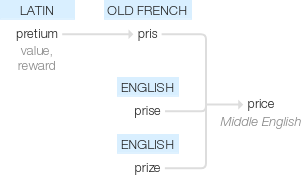Price
Middle English: the noun from Old French pris, from Latin pretium ‘value, reward’; the verb, a variant (by assimilation to the noun) of earlier prise ‘estimate the value of’ (see prize1). Compare with praise.
wiktionary
From Middle English price(“price, prize, value, excellence”), borrowed from Old French pris, preis, from Latin pretium(“worth, price, money spent, wages, reward”); compare praise, precious, appraise, appreciate, depreciate, etc.
etymonline
price (n.)
c. 1200, pris, "non-monetary value, worth; praise," later "recompense, prize, reward," also "sum or amount of money which a seller asks or obtains for goods in market" (mid-13c.), from Old French pris "price, value, wages, reward," also "honor, fame, praise, prize" (Modern French prix), from Late Latin precium, from Latin pretium "reward, prize, value, worth" (from PIE *pret-yo-, suffixed form of *pret-, extended form of root *per- (5) "to traffic in, to sell").
Praise, price, and prize began to diverge in Old French, with praise emerging in Middle English by early 14c. and prize, with the -z- spelling, evident by late 1500s. Having shed the extra Old French and Middle English senses, price again has the ancient sense of the Latin original. To set (or put) a price on someone, "offer a reward for capture" is from 1766.
price (v.)
"to set the price of," late 15c. (from late 14c. in the sense that has gone with praise (v.)), from price (n.) or a variant of prize (v.) or from Old French prisier, a variant of preisier "to value, estimate; to praise." See price (n.). Related: Priced; pricing.
